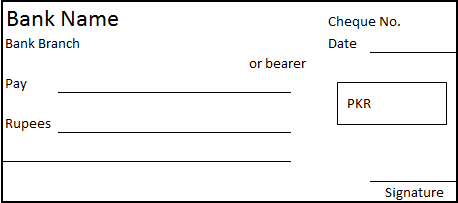Cheque is an instrument in
writing containing unconditional order, drawn on a banker, sign by the drawer,
and payable on demand. It is used to withdraw money deposited in the bank.
Following are the essentials of a cheque.
1. It must be in
writing.
2. It must be drawn on a
banker.
3. It must be in the form
of an order.
4. The order must be
unconditional.
5. It must be signed by the
drawer.
6. It must be payable
on demand.
7. The amount in the cheque
must be certain sum of money.
8. The payment must be made to
a person, bearer, or self.
Kinds of Cheque
1. Bearer Cheque:
A cheque which is payable to
any person who presents it at the counter of the bank is known as bearer
cheque. It can be transferred to another person by mere delivery. However, it’s
a risky cheque because if it is lost, the finder of it can receive cash
from the bank.
2. Order Cheque:
A cheque which is payable to a
person whose name is mentioned in it is called order cheque. In order cheque
the word “bearer” is cancelled. It can be transferred to a third person by the
order of the original payee.
3. Cross Cheque:
When a cheque is crossed by
drawing two parallel lines on the face it becomes crossed cheque. Such cheque
cannot be cashed at the counter of the bank. It is only be credited to the
payee’s account. It has the following kinds.
a. General crossing
b. Special crossing
General Crossing: When a cheque is crossed by drawing two parallel
lines on the face of it with additional words like “Payees A/c Only” or “Not
Negotiable” or “& Co”.
Special Crossing: When a cheque is crossed by drawing two parallel
lines on the face of it with a particular bank name.
4. Open Cheque:
When a cheque is not crossed
it is called an open cheque. Such a cheque can be cashed at the counter of the
bank. It may be a bearer or an order cheque.
5. Pay Order:
When a bank orders another
bank to pay a certain sum of money to a third party it is called pay order. It
is applicable for payment within a city. The bank issues a pay order to the
person who request for it and deposits sum equal to pay order plus bank
charges. Pay order provides guarantee that payment will be made by bank. It is
also known as banker’s cheque.
6. Demand Draft:
It is a cheque issued by one
bank in one city or country to another city’s or country’s bank in favor of a
third person. It cannot be dishonored as the amount is paid before. It is generally used to make payment outside a city.
Reasons for Dishonor of Cheque
Bank can dishonor the
cheque due to following reasons.
1. Irregular signature:
When the drawer signature does
not match with the signature bank has in its record. The bank will not accept
the cheque for payment.
2. Insufficient Amount:
When the fund is not enough in
drawer’s account to meet the cheque for payment, the cheque will be bounced.
However, in case of overdraft facility, bank can accept the cheque.
3. Insanity:
The bank will not accept the
cheque, if the accountholder gets insane and bank receives notice of insanity.
4. Bankruptcy:
When the accountholder is
unable to pay of his debts in full, and this bankruptcy is declared by the
court of law, the bank will not honor a cheque presented on behalf of such
accountholder.
5. Post-dated Cheque:
When a cheque is presented to
the bank for payment before the date written on it is called posted-dated
cheque. This kind of cheque cannot be cashed till that date arrives.
6. Stale Cheque:
The cheque which is older than
six months is known as stale cheque. The bank does not accept such a cheque.
7. Death:
When the accountholder draws a
cheque, and before it is presented to the bank, he dies, and bank receives such
information, the bank will dishonor the cheque.
8. Frozen Account:
If the customer account is
frozen by the court of law, the bank will not honor the cheque on behalf of
that customer.
9. Drawer’s Revocation:
If the accountholder draws a
cheque and issues it, after he directs bank not to make payment for such a
cheque, the bank will not accept it.
10. Alteration:
If any alteration in the
cheque is made and is not confirmed by the drawer by his signature, the bank
will dishonor it.




This was really helpful!
ReplyDelete<3